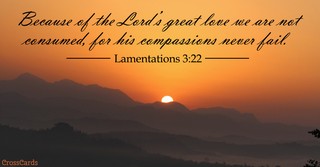
Change Translation
- Recent Translations
- All Translations
Ekhah 3:29
Share
Listen to Ekhah 3:29
Settings
Scripture Text Size
29
He putteth his mouth in the aphar; there may yet be tikvah.
Ekhah 3:29 Meaning and Commentary
Lamentations 3:29
or, "peradventure there is hope" F4; for, as some interpreters observe, these words do not express hesitation and doubt, but hope and expectation of help, to bear the yoke of God's commandments, and in due time to be delivered from affliction and distress.
FOOTNOTES:
F4 (hwqt vy ylwa) "forte est expectatio", Junius & Tremellius; "fortassis", Piscator, Cocceius; "forte est spes", Michaelis.
He putteth his mouth in the dust
Of self-abhorrence; sensible of his own vileness and nothingness, his unworthiness, and the unprofitableness of all his duties; ascribing the whole of his salvation to the free grace of God, ( Job 42:6 ) ; humbling himself under the mighty hand of God; not daring to open his mouth in a complaining way against him; but prostrating himself before him to the earth, as the manner of the eastern people in prayer was, to which the allusion is; licking as it were the dust of the earth, under a sense of the distance and disproportion between God and him, who is but dust and ashes; so the Targum adds,
``and is prostrate before the Lord:''if so be there may be hope;
or, "peradventure there is hope" F4; for, as some interpreters observe, these words do not express hesitation and doubt, but hope and expectation of help, to bear the yoke of God's commandments, and in due time to be delivered from affliction and distress.
F4 (hwqt vy ylwa) "forte est expectatio", Junius & Tremellius; "fortassis", Piscator, Cocceius; "forte est spes", Michaelis.
Taken from John Gill's Exposition of the Bible
Unlock Deeper Insights: Get Over 20 Commentaries with Plus! Subscribe Now
Ekhah 3:29 In-Context
27
It is tov for a gever that he bear the ol (yoke) from his youth.
28
He sitteth alone and keepeth silence, because He hath laid it upon him.
29
He putteth his mouth in the aphar; there may yet be tikvah.
30
He offereth his lekhi (cheek) to him that striketh him; he is filled full with reproach [Isa 50:6].
31
For Adonoi will not cast off l’olam (forever);
The Orthodox Jewish Bible fourth edition, OJB. Copyright 2002,2003,2008,2010, 2011 by Artists for Israel International. All rights reserved.

